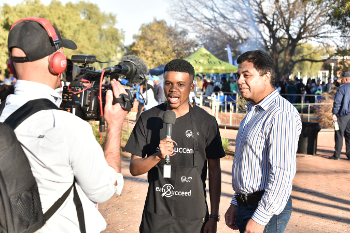Latest News Archive
Please select Category, Year, and then Month to display items
06 April 2018
Photo Rulanzen Martin
 From the left: Dr Thulisile Mphambukeli, leader of the BRICS research team that is exploring the political economy of water and food security, and her research partner, Dr Victor Okorie.
From the left: Dr Thulisile Mphambukeli, leader of the BRICS research team that is exploring the political economy of water and food security, and her research partner, Dr Victor Okorie.
A Brazil, Russia, India, China and South Africa (BRICS) delegation is to hold the 10th Annual BRICS Summit in the last week of May 2018 in Johannesburg. Dr Thulisile Mphambukeli, leader of the University of the Free State (UFS) research team alongside Dr Victor Okorie from the Department of Urban and Regional Planning, in collaboration with Prof Lere Amusan of North-West University, will ensure that water and food security is a prominent feature on the gathering’s agenda.
First, the project titled: “Exploring the political economy of water and food security nexus in BRICS and Africa” will debut at the National Institute for the Humanities and Social Sciences BRICS Think Tank Forum”.
According to Dr Mphambukeli, the key to water security is attitudinal change by means of education and conscientisation. This, she is adamant about, holds the potential to drive behavioural adjustments in the way society interacts with water.
Genetic and social approaches
Dr Okorie asserts that if strides towards reducing the demand for water were to be made, research efforts should be geared towards effecting changes at DNA level. Meaning we need to explore waterwise ways that enable crops and animals to thrive optimally.
The project also looks at social dimensions of water such as flushing a toilet. “Research activities on redesigning toilets, especially the urinal, where more than nine litres of water are used to flush less than one cubic centimetre of urine, are timely in the context of managing water and the food nexus crises,” said Dr Okorie.
Combining the genetic and social approaches would allow us to produce more with a smaller water footprint. This can be made possible by implementing precision agriculture which is about estimating and applying exact quantities of water and nutrients needed for the production of crops or the raising of livestock.
Paradigm shifting policies
Prof Amusan said the team intended to propose functional solutions that take the quality of water into consideration. Equitable production and distribution of water depends on endorsing policies of co-production between citizens, governments and the public sector. BRICS member states mutually consider water and food security as an issue of paramount significance, hence its feature on this prestigious summit’s agenda.
Kovsie Biggest Braai a huge success
2017-08-30

Prof Francis Petersen, also attending the braai, is here being
interviewed by one of our #KovsieCyberStas, Thuli Molebalwa.
Photo: Charl Devenish
Even though Braai Day is celebrated nationally in September, students at the University of the Free State (UFS) had their own braai day. The Kovsie Biggest Braai was the biggest student community event of the year.
Takudzwa Nyamunda of the International Student Council said the idea for the braai came from the International Student Association as a social cohesion event for international students. “When the idea was presented to my office we realised the potential for such an initiative to be not just for students but for the whole Kovsie community.”
They realised there were not a lot of social cohesion events on campus where students and staff could just take a day to relax and embrace the feeling of being a Kovsie. He said he believed the braai could provide the right platform. The main objective of this project was to make it an institutional event with aspects of fundraising for the future.
Colleges made KBB a success
An estimated 3500 people attended the festivities on Red Square on 12 August. “We used the college format for the braai and it was set in the form of a challenge between the five colleges, but one of the colleges pulled out,” Takudzwa said. The colleges that did participate made a big contribution towards the success of the event and did all the braaing and selling.
Creating new Kovsie traditions
The idea behind the pilot project is that it becomes an annual event which in turn will form part of a new Kovsies tradition. “It received endorsement from top management therefore I believe it will form part of the Kovsie calendar for years to come,” Takudzwa said.